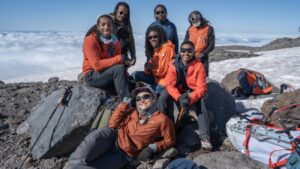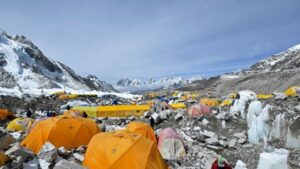Full Circle Everest is a seven-member team of Black climbers who set out to conquer Mount Everest and did it successfully.
The team successfully climbed the world’s tallest peak in 36 days. After successfully conquering it, they wholeheartedly shared the news on Twitter. Thus ran the report on people.com by Mary Ellen Cagnassola on May 13 this year. They have been in focus again because of a conversation between a Full Circle Everest team leader, Eddie Taylor, and Samantha Coetzee from www.kunc.org. We will give a gist of the interview but first let’s give us an overview of their adventure.

At the annual summit, hundreds of people attempted to scale Mount Everest, but in 2018, fewer than 10 were Black. In May, the first all-Black team to have scaled the summit was part of the Full Circle Everest Expedition. Some of the team members were from Colorado.
The team members of the Full Circle Everest summited Mount Everest on May 12. While many team members did not summit, all members of the climb and all Sherpa team personnel successfully returned to Base Camp, where the team had been celebrating this historic event.
The summiting team consists of Manoah Ainuu of Bozeman, Montana; James Kagambi a Kenyan climber; Rosemary Saal a Seattle climber; Desmond “Dom” Mullins of New York City; Abby Dione of a Florida climber; Eddie Taylor a teacher and from Boulder, Colorado; and Thomas Moore of Denver.
They were accompanied by Sherpa climbers and led from base camp by Henderson, as stated in Jiban Ghimire, Managing Director of Shangri-La Nepal Treks, confirmed to the Himalayan Times. During an interview on the PEOPLE Everyday podcast, Ainuu, a North Face athlete, said that the history-making undertaking was organized as an attempt to increase the climbing zone representation.
What Ainnu recalled then went like that they had had that same experience of standing out being the only person that was Black, with dark skin, doing what they loved in the outdoors. It was even more empowering to be together with cherished friends and family with similar experiences. It’s so amazing to take part of an adventure.
In the opinion of the Full Circle Everest Team, of the approximately 10,000 successful summits made on Mount Everest since 1953, information suggests that only 10 Black mountaineers have stood near the top. The Full Circle Everest team’s completion of this climb nearly doubles that amount. To quote Ainnu exactly “In spite of the fact that I am confident in climbing and all, it just doesn’t feel right to be on top”. He sadly experienced that people around them who didn’t look at the new equipment and gears worn by them, rather their gaze stuck at their skin color. Those made him think that a certain white man still may question this success.
“The Full Circle Everest Team represents a zenith in generational perseverance,” this team wrote on its website. This expedition is proof of the tenacity and strength of these black climbers, and to show the significant barriers that continue for large Black communities in reaching the outdoors. This mission will inspire the next generation. Once someone from this community will make it to the top of Mount Everest personally.
Full Circle Everest Team leader Eddie Taylor Interviewed by Samantha Coetzee, KUNC
All this shared by now had been news up to May, this year. But KUNC has given a boost by publishing an interview of Eddie Taylor, a Full Circle Everest team leader who is also a chemistry teacher by professional and no doubt a mountaineer by passion. Here is a short description of the conversation between Eddie Taylor and Samantha Coetzee from KUNC.
Samantha has asked him how had he ended up joining that team? What was their goal? How did Everest come to their mind? and why is it important to focus underrepresented communities in that industry? and Eddie Taylor answered all that bit by bit.
Taylor said that he started to learn about it, and wasn’t thrilled about it at first. He is a climber and climbs a handful of times yearly, but substantial mountain summits are something that he’ll just dabble in. Long story short, he was not that enthusiastic about hiking Mount Everest, and hardly ever considered conquering that objective to be an option.

However, Phil probably unintentionally convinced him (E.T) and made him (E.T) think he had been a valuable asset to the team. At that point, they talked about the bigger picture of the matter, and at that time, they did not know quite the difference in scope between the number of Blacks who traveled on Everest, and how much the chance was for this.
To answer the question why they feel it is crucial to represent a certain community in that industry. Taylor has answered that he thinks that honest communication is extremely important in every industry. In climbing, for example, some people haven’t felt comfortable in as much as they have in basketball or baseball. Honestly, 2 % of the population or 2 % of teachers are black Americans. I’m a schoolteacher, and I believe 2 % of the population or 2 % of teachers are black males.
It’s not just a thing with regard to outdoor activities, but it’s something we all have influenced over. And we therefore have a chance to improve our lot.
